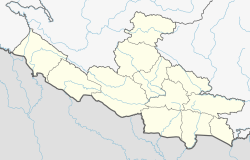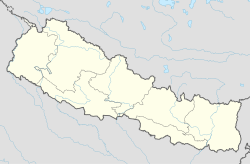Rolpa Airport | |
|---|---|
| Summary | |
| Airport type | Public |
| Owner | Government of Nepal |
| Operator | Civil Aviation Authority of Nepal (CAAN) |
| Serves | Rolpa Municipality |
| Location | Rolpa District, Lumbini Province, Nepal |
| Opened | November 6, 1980 |
| Coordinates | 28°16′03″N082°45′23″E / 28.26750°N 82.75639°E |
| Map | |
 | |
Rolpa Airport is an airport in Rolpa District, Lumbini Province, Nepal. [1]
The ICAO code is VNRP and the IATA code is RPA. [1] It is currently not in operation. [2]
note: it was not available right know

